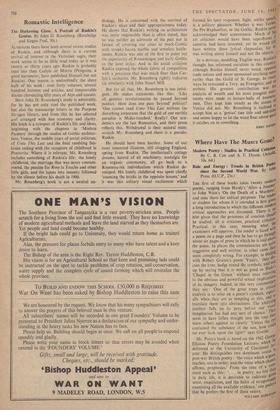Where Have The Muses Gone?
Rule and Energy : Trends in British reetril since the Second World War. By Press. (0.U.P., 25s.) THE first of these books takes twenty mode°, poems, ranging from Hardy's 'After a JourneY, to John Wain's 'On the Death of a Murderer, and uses them for critical purposes. The reader or student for whom it is intended is first give° a long introduction in which the different mole° critical approaches are discussed. There is n! hint given that the processes of creation shout' be studied; all is criticism, practical criticisnl' Practical, in this case, meaning what examiners will approve. The reader is faced Wit, a poem on a page and then he has to go throllPt about six pages of prose in which he is told abn.tte the poem. In places the commentaries are Olt, suggestive and well written; in other cases the,,,/ seem completely wrong. For example, in dealill6 with Robert Graves's poem 'Vanity,' they di5; cuss the tone, hedge round the symbols, and enrs up by saying that it is not as good as Blake 'Chapel in the Green,' without once referring to the obvious and powerful sexual implication' of its imagery. Indeed, in this very commental they say : 'One of the great traps in critte; analysis is to seize on a poem's symbols, esPec:0- ally when they are as tempting as this, and.' translate them into abstractions. The analYsl intellect falls on its prey before our vislit imagination has had any sort of chance.' The', seem to have fallen straight into the trap the'e warn others against so clearly. 'Unless the eYid contained the substance of the sun, how CO° we ever look upon the light?' says Goethe. Mr. Press's book is based on the 1962 Gear Elliston Poetry Foundation Lectures which "t delivered at the University of Cincinnati la.s. year. He distinguishes two dominant voices 11' post-war British poetry: 'the voice which argues; teaches, sets in order; and the voice which chant affirms, prophesies.' From the tone of a alit; ment such as this: . . in poetry, no less that' in daily life, it is desirable to cultivate Pnly sense, empiricism, and the habit of scrupu100 examining all the available evidence,' one gat'
that he prefers the first of these voices. coN
WILLIAM ANDER--


































 Previous page
Previous page